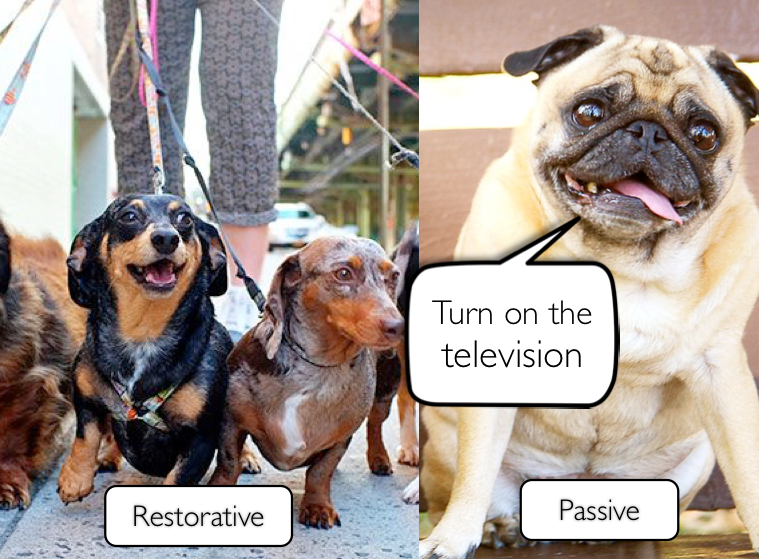
Do you have a tendency to push yourself? Do you burn the midnight oil?
If so, the way you’re working isn’t working.
Sure, I know how it is. When you work until late at night (when others are sleeping), you feel like you’re being super productive. It feels like you’re getting lots done. You think you’ve got one up on the rest of the world.
But in actual fact, you’re less productive.
Think of top performing athletes. They don’t train at an intense level 24/7 for a reason. They have rest days where they simply stretch, do strength training or go for a massage.
Without rest periods, athletes run the risk of injuring themselves and burning out before the big event.
Similarly, if you study for hours on end with no breaks, what’s likely to happen?
You increase the odds of getting sick, draining yourself mentally and/or burning out.
As Alex Soojung-Kim Pang says in his book Rest – Why You Get More Done When You Work less:
“If you want to succeed, you need to avoid exhaustion.”
For many years I was one exhausted student.
When I was at university, there were days when my friends and I would work until late at night on our assignments. We’d work in the computer labs until midnight, only stopping briefly to get sugary snacks from the vending machine to keep us going.
At the time we thought working until late at night was a great idea (“Let’s smash this out!”) but looking back, this was an inefficient and unhealthy approach. Why?
Because the next day was always a write-off. We would feel exhausted. Our brains weren’t up to the job of wrestling with complex ideas.
As Cambridge mathematician John Littlewood states:
“It is too easy, when rather tired, to fritter away a whole day with the intention of working but never getting properly down to it. This is pure waste, nothing is done, and you have had no rest or relaxation.”
So squeezing in an extra 4-5 hours of low quality, unfocused work in the evenings would nearly always cost my friends and I an entire day. In Littlewood’s words, our day would be “frittered away”.
But at some point, the penny finally dropped.
As a student, you are always better off to knock off earlier in the day, get some rest and relaxation so you can feel mentally sharp and refreshed for the next day.
I also learnt that when you rest, you can work better. Everything feels a lot easier with a refreshed mind and body.
As Alex Soojung-Kim Pang states:
“Rest is not work’s adversary. Rest is work’s partner. They complement and complete each other.”
Contrary to popular belief, rest isn’t a passive activity.
It’s not about lying on the couch and watching TV. Rest can be a timed power nap, a walk around the block, a vigorous cardio session at the gym or a game of cards with a friend.
It may sound strange but rest is something you need to work hard at. It’s something you need to make time for. And it’s a skill you can get better at. It just takes practice.
The school year isn’t a sprint. Approach it more like a marathon. You don’t want to burn out in the first 100 metres. So you need to pace yourself. You need to practice deliberate rest.
So the question is how will you practice deliberate rest today? What activities will you engage in to recharge your batteries? Feel free to post a comment below.
Share This:

It had been an intense year of work and study. I desperately needed a break.
So I packed a backpack and went hiking with a group of friends. We did the sorts of things you see people do in wilderness films: we swam in rivers, slept under the stars, and ate the simplest of meals.
Five days later, I re-emerged from the forest feeling re-energised and with a new perspective. I felt excited about life again.
If you’ve ever skipped a holiday or used your holidays to catch up on work, you know at some level this is bad for your soul.
Research shows people who skip holidays are more likely to:
• suffer from burnout;
• feel emotionally exhausted;
• be less productive;
• have trouble concentrating during their free time after work; and
• find it harder to deal with the challenges of work, study, and life.
Think of the last time you felt really exhausted. How easy was it for you to do your work?
With a tired mind, it’s hard to get anything done. You can’t do your best work.
Let’s face it . . .
You’re not a machine.
You’re a human being.
Your energy is finite.
You have limits.

Following any period of intense or stressful work, you need to rest and recover.
If you choose to ignore your biological limits and burn yourself out, it can take 12 months to fully recover. It’s your choice. Your call. Personally, I wouldn’t risk it.
So it’s time to get serious about rest and in particular, holidays.
Let’s take a quick look at the science . . .
Research by Sabine Sonnentag and her team found we need to experience the following four things to fully recover from stress:
1) Relaxation;
2) Mental detachment from work;
3) A sense of being in control; and
4) Mastery experiences.
In his book Rest: Why You Get More Done When You Work Less, Alex Soojung-Kim Pang encourages us to think of breaks as being like meals. You want your meal (i.e. your break) to be nourishing, so it needs to be high in all four of the components listed above.
The good news is you can train yourself to get better at doing these four things. It just takes practice.
Below we explore each of these factors in more detail. Read on!
This is about calming your mind and body.
What’s the best way to relax?
There are no hard and fast rules but you could try:
• Meditating;
• Having a massage;
• Listening to relaxing music;
• Spending time in nature;
• Doing yoga;
• Breathing exercises; and
• Taking a long hot bath.
What do these activities have in common?
They require very little effort. And they make you feel good!
Research by Frederickson (2001) found that when people feel good (i.e. they experience positive emotions) this helps to boost their energy levels.
Have you ever found yourself worrying about school/work when you weren’t at school/work?
When you do this, you’re wasting your precious (and finite) mental energy. But what’s even worse is that no recovery can occur when you worry.
One study by Sonnentag, Binnewies and Mojza (2008) found that low psychological detachment from work in the evening is associated with feeling exhausted and tired in the morning.
Want to wake up feeling refreshed and alert? Then stop any negative thoughts about work and school as soon as you get home.
Easier said than done, right?
Again, it’s just practice.
Here are some strategies that help me to switch off from my work/study:
• Set a worry time (worry o’clock): Find yourself worrying? Quickly jot down the thought that is bothering you. Then tell yourself you’ll revisit that thought later at worry o’clock.
• Create non-work zones in your room/home: Deliberately segment work and off-work life. Don’t bring any work into your non-work areas.
• Don’t do any work on your holidays: Put your books and notes away. Your top priority is to have fun, relax and engage in mastery experiences (see point 4 below).
• Get moving: Engaging in intense physical exercise can provide ‘time out’ from worrisome thoughts. When I exercise, my focus is just on doing each movement (nothing else). I tune into how my body feels. Increased levels of endorphins, serotonin, and dopamine following exercise also help with the recovery process.
Do you feel in control of your time when you’re not at school or work? Can you engage in activities that you enjoy and find meaningful?
If the answer is no, you need to work on feeling more in charge of your life.
Here are some questions to consider:
• Are you overscheduled?
• Could you cut back on a few activities/commitments to free up more time for fun and relaxation?
• Can you outsource any activities?
• Can you do certain activities more efficiently to free up more time?
• Can you reduce time confetti in your life?
These are experiences that challenge and stretch you in some way. When you engage in them, you tend to forget about your work and/or school.
These activities require you to exert a bit of effort, but you don’t want them to leave you feeling completely exhausted.
Here are some examples of mastery experiences:
• Physical exercise;
• Learning a new instrument (e.g. the piano);
• Learning a foreign language;
• Volunteering in the community; and
• Taking a free online course on a topic that interests you.
As a general rule of thumb, try to limit time on digital devices over the holidays.
Let me be clear: technology can be a great tool to help you engage in a mastery experiences. But depending on how you use it, it can also inhibit the recovery process.
Screen time leisure activities, such as scrolling on your phone and watching Netflix, don’t really challenge us. We typically sit down and enter a passive, zombified state. This in turn can lead to boredom, apathy and depression.
For every hour you spend in front of a screen, that’s an hour you could have spent at the beach, going for a walk in nature, working on a creative project or learning how to cook a new dish.
Here’s another reason to limit your screen time . . .
If you’re looking at a screen 30 minutes before going to bed, you’re messing with your melatonin (a hormone that makes you feel sleepy). The light emitted from screens has been shown to suppress the production of melatonin, thereby making it harder for people to fall asleep.
Scrolling through your social media feed so close to bedtime also means you’re at risk of seeing content that upsets you.
Put simply . . .
As Demerouti and her team state:
“The better an individual’s physiological and psychological state before bedtime, the longer and better the quality of sleep she/he will have. A better quality and quantity of sleep in turn leads to a better psychological and energetic state the next morning before going to work.”
So put your phone to bed at least 30 minutes before you plan on going to bed. This simple action could change both your mood and outlook in dramatic and profound ways.
For these holidays, I encourage to explore and experiment with different ways to make your break truly restorative. And most importantly, make sleep your top priority.
Many of us are sacrificing the quality of our lives by going too hard at living.
It’s drilled into us that in order to succeed, we need to be constantly working, striving towards our goals and improving ourselves.
Don’t get me wrong, I’m a big fan of self improvement. I’m all for doing things more effectively. But sometimes you need a little time out.
In team sports, coaches will often call ‘time out’ as a way to regroup, reflect and recharge.
But we’re not so good at taking time out for ourselves. And it costs us. There is plenty of research to show overwork is bad for your health (see here, here and here).
In the book The Inner Self: The joy of discovering who we really are, author Hugh Mackay describes busyness as being a health hazard. He states:
“ . . . it robs us of the sanity-restoring time for reflection on our inner life, and may even dull our awareness of the need for regular encounters with the self.”
Over the last few months, I’ve been engaging in an activity that allows me to slow down, take pleasure in small things and rest while still being somewhat productive.
It’s called pottering.
In the book Pottering: A cure for modern life author Anna McGovern describes pottering in the following way:
“Pottering is not glamorous. You don’t have to put too much effort in, go very far or even do it with others. Pottering is not a lifestyle concept, and it doesn’t require practice. Just be.
The consequence of pottering – a feeling of relaxation and contentment- is usually achieved when you make do with what you’ve got, get moving but don’t go too far, don’t try too hard and keep it digital free.”
Pottering allows you to recalibrate to a saner and healthier pace of life. It reminds you that there’s so much more to life than being productive.
When you potter, there’s no pressure to achieve results or a perfectly clean room/home. And there’s also no need to share your pottering experience on social media. That would defeat the purpose. Why? Because pottering requires you to take time out from screens.
What I love about pottering is you get to set the bar extremely low. In fact, you don’t have to accomplish much at all.
According to Anna McGovern, pottering involves adhering to the following five basic principles:
When you potter, there’s no need to rush out and buy new things. Pottering is about being resourceful. It’s about thinking on your feet and making do with what you’ve got.
For instance, instead of buying takeaway for lunch, you challenge yourself to pull together a meal with what you’ve got in your fridge and pantry. In some ways, pottering can be a very creative practice.
When you potter, there’s no where to get to. Nothing to achieve. The aim of the game is to slow down and enjoy doing one activity at a time.
McGovern offers this wisdom:
“Consider the words that define pottering ‘without definite plan or purpose’. Let those words really sink in . . . You have the freedom to make tea any way you like. You be you. No one is going to judge. It’s just you and the tea.”
Pottering doesn’t involve vigorous exercise but it usually involves simple movements like pulling things out from cupboards, rearranging items in rooms, folding clothes, filing away or tossing papers, etc.
You get to go with the flow. Let’s say you’re putting away an item and you stumble across something else that needs attending to (e.g. a drawer that need rearranging), you can change course. Remember, you don’t have to be efficient or productive when you potter.
All that being said, it’s also totally fine to plonk yourself down in a cosy chair and enjoy a cup of tea.
Pottering days are chill days. You are unauthorised to rush around. McGovern recommends you do things locally on your pottering days.
On my pottering days, I like to keep away from my car and use my bike and legs as transport. This helps me feel more connected to my local community. With the car off limits, this means I can’t travel very far. When I’m in full pottering mode, an epic journey is the local library.
It’s time to dial down the noise in your life and brain. Keeping away from your phone, Netflix and social media will help. As McGovern states:
“ . . . ignoring digital devices and limiting your access to them also means that you are not constantly bombarded with messages, information, unrealistic images of perfection and pictures of social occasions that you haven’t been invited to.”
McGovern recommends finding old-school alternatives for your phone for the times when you potter. She suggests using a calendar, alarm clock, radio, TV, a landline, newspapers, notepad and pen, map and cash.
Life is short. Don’t run yourself ragged trying to get ahead and be a productivity machine. Slow down. Take a day or afternoon off and give yourself the freedom and space to potter.

When I was working on my doctorate, I was part of a writer’s group at university.
We would meet three times a week to write in 45 minute sprints (no distractions), followed by 15 minute breaks. By lunchtime, we had completed three 45 minute writing sessions. I felt like a vegetable by the end of the third sprint but I had words down on paper. That’s all that mattered.
There were two main challenges we all faced on writing group days:
1) Showing up to write (this was by far the hardest part); and
2) Being disciplined to get back into writing after taking a 15 minute break.
I developed strategies to help me deal with both of these challenges. This blog post focuses on strategies that can help you deal with the second challenge: Getting back into your work after taking a short break.
Forget willpower and motivation. Enter habits.
I often meet students who will say, “I’m lazy”, “I’ve got no willpower” and “I wish I more motivated and disciplined like you”.
Reality check: willpower will only get you so far in life. What do you need? Strategies. That’s worth repeating again: you need strategies. Strategies that will help you show up and get to work. And then get back to work after taking a break.
Strategies that you turn into habits so you don’t even have to think about doing them. You just automatically execute the behaviour. Boom! And that there is the power of a habit. You go into zombie mode and do what needs to be done.
Strategies to get back on track (after taking a break)
Below are seven strategies you can experiment with to help you get back into studying after taking a short break:
1) Use a timer
If I don’t set a timer for my breaks, it’s just too easy for my breaks to drag on and on. I tend to get lost in random activities (reading, cleaning my room, making a lasagna, etc).
The timer is my prompt. It’s my cue. When it goes off after 5 minutes, I know it’s time for business. It’s time to get back into it. No excuses.
Of course, there have been times when I have simply ignored the beeps coming from my timer. But without those little beeps, it’s a lot harder to get back on track.
2) Create a list of short break activities
Grab a piece of paper or a whiteboard and write down what you plan to do on your breaks. Will you go for a quick 5 minute walk? Will you make a smoothie? Will you prepare a healthy snack? Write these activities down.
If you’re clear on what you’ll be doing on each break, you’re more likely to stick to just doing that and not stray from those activities. You’ll also have a sense of how long each task will take. You know that making a smoothie doesn’t take very long. But starting a new netflix series? That could take anywhere from 30 minutes to several hours.
3) Choose your activities wisely

Rest activities such as ‘Go on Youtube’ or ‘Watch Netflix episode’ ring alarm bells for me. They make me feel nervous. Here’s why …
Unless I turn off the autoplay feature, it’s just too easy to get screen sucked into the vortex of the Internet. Instead of watching one episode of a Netflix series, before you know it you’ve watched the entire first two seasons.
In addition, activities in front of any screen tend to be passive. This means they are rarely as relaxing and restorative for our minds as other break activities (e.g. physical movement and spending time out in nature).
If you’re like most people and tend to get screen sucked easily, reserve these passive activities as rewards for later in the evening (after you’ve completed the most important/urgent/hardest pieces of work).
4) Enlist a team of gentle naggers
Other people can help us stay on track. You see, often when we procrastinate, we don’t realise we’re doing so. It can be incredibly helpful to have another person point out when we’ve gone astray. It can be as simple as, “Don’t you need to finish that assignment tomorrow? You’ve been watching cat videos for over 30 minutes. Seriously …”
These gentle reminders can save you hours of time and help you avoid last minute cramming.
5) Create an imaginary friend

Work as if there is someone standing over your shoulder. Work in such a way that the imaginary person standing over your shoulder would think, “Wow, look at her go! She’s a study machine! She knows what she’s doing. What a powerhouse!”.
I realise this sounds a little crazy, but it works.
6) Ask yourself some tough questions
It’s easy to get lost in random activities on your breaks. Some activities can become all consuming, such as reading trashy celebrity news. At some level we all know reading celebrity gossip isn’t a good use of our time but it can be hard to stop once you start.
Here’s a simple trick you can use: set a timer to go off every hour. When the timer goes off, ask yourself the following questions:
What am I doing right now?
Am I doing what I need to do?
Is this the best use of my time?
If you’ve strayed from what you need to be doing, don’t beat yourself up. Gently guide yourself back on track.
7) Get clear on the next microtask
You might be avoiding getting back into your work for the simple reason that you feel stuck. Let’s face it, feeling stuck can be demoralising.
You need to break the inertia by engaging in a small microtask.
A microtask is the smallest and easiest task you can do. It shouldn’t take more than a few minutes. Write that task down on a whiteboard.
Now is the time to block out everything else (turn off your phone, lock yourself out of the Internet, etc) and declare, “This is all I need to do. Nothing more!”. Once you’ve done the microtask, celebrate! You’re back in action!
Turning these strategies into habits
You may have heard that it takes 21 days to form a new habit. I want you to erase that idea from your memory because quite simply, it’s a myth. There’s no evidence to back that idea up.

This study found it actually takes about 66 days to form any new habit. Some new behaviours can take longer (more than 250 days).
The key to making any new behaviour a habit is to engage in the behaviour frequently. Do it over and over and over again. And then do it some more. Rinse and repeat.
Basically, the more times you engage in the behaviour, the sooner it will become a mindless habit.
To sum up
So just to recap, if you have trouble pulling yourself back after taking a break, try using one of the following strategies:
1. Use a timer to outsource your breaks
2. Create a list of short break activities
3. Choose your activities wisely (Go restorative, not passive)
4. Enlist a team of gentle naggers (“Come on, it’s time to get back into it!”)
5. Create an imaginary friend (“Wow! Look at you! You are so productive!”)
6. Ask yourself some tough questions (Am I doing what I need to do?)
7. Get clear on the next microtask
Here’s a little challenge for you: Pick one of these strategies and test it out within the next 24 hours. Don’t be disheartened if you find yourself faffing around online way past your short break time. Remember, new habits take time to establish (usually more than 21 days).
Want to learn more study strategies to help you focus? Download a free copy of my eBook 70 ways to minimise distractions and focus better.
Dr Jane Genovese delivers interactive sessions on learning to learn, combating procrastination, exam preparation, how to focus in the age of distraction, habit formation and much, much more!
Get FREE study and life strategies by signing up to our newsletter:
© 2024 Learning Fundamentals